Independence is a central pillar of the IJ4EU fund. No donor is permitted to exert influence over the selection of grantees or their work. That’s why independent juries award all our grants. An independent jury also selects winners of the IJ4EU Impact Award.
Juries are made up of individuals with a deep understanding of the global challenges facing independent journalism, particularly in Europe, including practising journalists, senior editors, media lawyers, academics and other relevant experts.
All jury members must commit to the highest ethical and professional standards. They must declare any possible conflicts of interest and recuse themselves on any judgment where such conflicts may interfere with independence or the public perception of independence. These recusals will be recorded.
Decisions by juries will take account of transparent criteria published on the IJ4EU website. Aside from jury chairs, the identities of jury members are kept secret until all projects or awards have been chosen for a given grant or award cycle.
Below are profiles of past jury chairs and jury members, as well as the chair of the current independent jury for IJ4EU’s Investigation Support Scheme.
Investigation Support Scheme 2024/25
-
Carlos Dada (Chair)
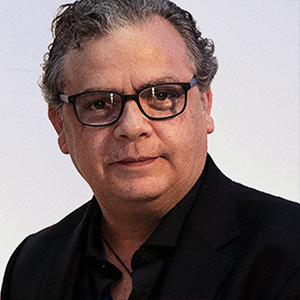 Carlos Dada (Chair), co-founder of El Faro (El Salvador)
Carlos Dada (Chair), co-founder of El Faro (El Salvador)Carlos Dada is an award-winning Salvadoran journalist and co-founder of El Faro, Central America’s groundbreaking digital investigative news outlet. A pioneer in independent journalism, Dada has spent over two decades exposing corruption, violence, and abuse of power in one of the most dangerous regions in the world for reporters.
Founded in 1998 in post-civil war El Salvador, El Faro has become a model of high-impact investigative reporting. Under Dada’s leadership, the newsroom has revealed major corruption scandals involving former presidents, documented systemic human rights violations and pursued long-form investigations that often span years. Dada and his team have persisted despite constant threats, smear campaigns and surveillance — including being targeted with Pegasus spyware while investigating government links to organised crime.
Known for his integrity and fearlessness, Dada has reported widely on war crimes, migration, drug trafficking and environmental destruction. His work has earned him numerous accolades, including the IPI-IMS World Press Freedom Hero Award, the Maria Moors Cabot Award and the ICFJ Trailblazer Award.
-
Ioana Avadani
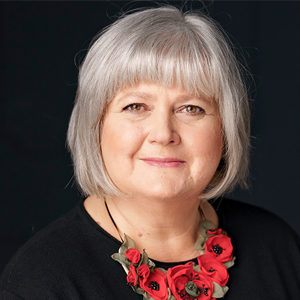
Ioana Avadani, president of the board, Center for Independent Journalism (Romania)
Ioana Avadani heads the Center for Independent Journalism (CIJ) in Bucharest. In 2013, she was awarded the European Citizen of the Year prize by the European Parliament.
She has over 25 years of experience in the media, having worked as a news agency deputy editor-in-chief, a TV editor and as a media developer with CIJ.
As CIJ director (1998-2019), Avadani coordinated programmes ranging from professional training for journalists to targeted assistance for media operations, from advocacy for transparency, press freedom and protection of journalists to curricula development and strengthening of journalists’ associations in Romania. She was instrumental in the passing of critical legislation such as access-to-information and sunshine laws, the broadcast law and public broadcasting services and public procurement legislation. She has also been central to media self-regulation in Romania. In 2018, she was elected president of the CIJ board.Between 2004 and 2006, Avadani served two stints as president of the South East European Network for the Professionalization of the Media, a network of 18 training centres and media institutes in 10 countries in Southeastern Europe. Between 2015 and 2019, she served as a member of the Council of IFEX, one of the largest global networks of organisations specialising in freedom of expression.
Avadani has published numerous articles and studies dedicated to media development in Romania and the SEE region. She was a Visiting Research Fellow with the Media and Democracy in Central and Eastern Europe Programme at St Antony’s College at Oxford University. She has appeared as a speaker at many national and international events and taught numerous courses for various audiences. She has an MA in Anthropology and an MA in Applied Ethics. She is completing a PhD in Anthropology. -
Pilar Requena
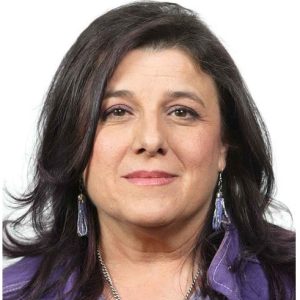
Pilar Requena, chair of the steering committee of the EBU Investigative Journalism Network (Spain)
Pilar Requena is a distinguished Spanish investigative and international journalist, with a career spanning nearly four decades. Known for her fearless reporting, sharp geopolitical analysis and dedication to public interest journalism, she is the Director of Documentos TV, the prestigious documentary program on RTVE, Spain’s public broadcasting corporation.
Since 2021, Requena has also chaired the Steering Committee of the European Broadcasting Union’s Investigative Journalism Network, where she plays a leading role in shaping cross-border collaborations that strengthen journalistic integrity across Europe. She has represented RTVE in this network since 2018, bringing her deep experience in global affairs and investigative storytelling to the European stage.
Her international reporting career began in 1987 and has included major roles such as correspondent in Berlin for Germany and Central and Eastern Europe (1999–2004), and a long tenure as a senior reporter for En Portada, RTVE’s flagship international affairs program (2004–2020). Her work has taken her from the corridors of European power to conflict zones in Afghanistan, Pakistan, Syria, Liberia and beyond.
A respected academic and analyst, Requena has also lectured in journalism and international relations at universities in Madrid and contributed extensively to the Spanish Institute for Strategic Studies (IEEE), publishing analytical pieces on terrorism, transitional justice, peace processes, and global security. Her commitment to thoughtful, ethical journalism is matched by her academic contributions to understanding complex international issues.
She is the author of several books, including El Populismo Pardo (2025), a study of the far right in Germany; Angela Merkel, la canciller eterna (2021); La potencia reticente (2017), on post-Cold War Germany; and Afganistán (2011), a deeply reported account of the country’s long conflict. She is also co-author of Queremos Saber (2012), which examines the crisis of journalism from the perspective of foreign correspondents.
Requena’s journalism has been widely recognised. She is a recipient of the 2022 Ones Award for her lifelong commitment to human rights, the prestigious King of Spain International Journalism Award, the European Civis Award and the Salvador de Madariaga Award.
-
Michael Montgomery
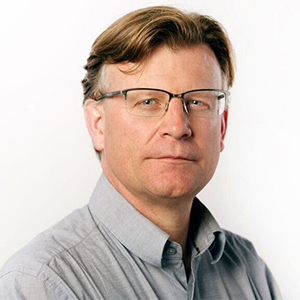 Michael Montgomery, senior reporter, Center for Investigative Reporting (United States)
Michael Montgomery, senior reporter, Center for Investigative Reporting (United States)Michael Montgomery is a senior reporter and broadcast producer for the California-based Center for Investigative Reporting and its podcast, Reveal.
Montgomery leads major collaborations and reports on America’s penal system, human rights and international trade and labour exploitation. Previously, he was a senior reporter for American Public Media, an associate producer for CBS News, and a Balkans correspondent for the Daily Telegraph, where he covered the wars in Croatia and Bosnia and the siege of Sarajevo.
Montgomery’s investigations into human rights violations in Kosovo led to the prosecutions and convictions of Serbian and Albanian paramilitaries and sparked the creation of a special war crimes tribunal in The Hague. More recently, he co-produced an investigation into forced labour in the Dominican sugar industry that led to a U.S. import ban.
Montgomery is the recipient of numerous honours, among them Murrow, Peabody, IRE, duPont and Overseas Press Club awards. He is a longtime member of the International Consortium of Investigative Journalists and serves on the board of the World Press Institute.
-
Paola Totaro
P
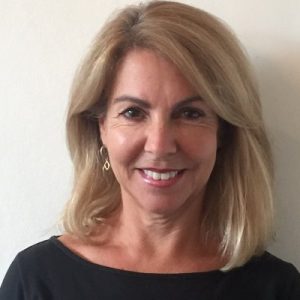 aola Totaro, award-winning freelance journalist and author (United Kingdom)
aola Totaro, award-winning freelance journalist and author (United Kingdom)Paola Totaro is an award-winning Italian-Australian journalist and editor and a former President of the Foreign Press Association in London.
A former Europe correspondent for The Sydney Morning Herald and The Age (Melbourne), she is based in London and writes on social policy, politics and culture for Australian and British publications, including The New European.
She is the author of On the Scent: Unlocking the Mysteries of Smell – And How its Loss Can Change Your World (Elliott and Thompson, 2023). Totaro was awarded her PhD in the Department of English, Goldsmiths, University of London, the same year.
IJ4EU Impact Award 2024
-
Paul Caruana Galizia (chair)

Paul Caruana Galizia became a journalist at Tortoise after his mother was assassinated and since then has won an Orwell Prize special award, a British Journalism Award and Press Award, and other honours for his reporting. With his brothers, he has received a Magnitsky Human Rights Award and an Anderson-Lucas-Norman Award for campaigning to achieve justice for Daphne. His book A Death in Malta won the Cornelius Ryan Award from the Overseas Press Club.
-
Nik Williams

Nik Williams is a media freedom and free expression advocate based in Glasgow, who currently contributes to Index on Censorship‘s work on SLAPPs, digital rights and transnational repression. He is the co-chair of the UK Anti-SLAPP Coalition and the convenor of the Scottish Anti-SLAPP Working Group. At ECPMF, he coordinated the inaugural year of the Media Freedom Rapid Response (MFRR), which responds to violations of media freedom in Europe. Previously, Nik led Scottish PEN’s campaigning and advocacy, focusing on defamation reform, free expression, digital rights and surveillance policy. Nik is also the co-chair of the investigative journalism co-op, The Ferret.
-
Gabriela Manuli
 Gabriela Manuli is the Deputy Director of the Global Investigative Journalism Network (GIJN), an association of 250 non-profit organisations in 91 countries dedicated to investigative reporting. In 2019, she co-founded the GIJN Women Group, a network created to discuss issues related to women and non-binary investigative journalists. A native of Argentina (and currently based in Budapest, Hungary), she has been a journalist for more than 20 years (working for radio, TV, magazines and newspapers) and has extensive international experience in Latin America, Europe and the United States.
Gabriela Manuli is the Deputy Director of the Global Investigative Journalism Network (GIJN), an association of 250 non-profit organisations in 91 countries dedicated to investigative reporting. In 2019, she co-founded the GIJN Women Group, a network created to discuss issues related to women and non-binary investigative journalists. A native of Argentina (and currently based in Budapest, Hungary), she has been a journalist for more than 20 years (working for radio, TV, magazines and newspapers) and has extensive international experience in Latin America, Europe and the United States. -
Christopher Hird
 Christopher Hird is the founder and managing director of Dartmouth Films , which has pioneered new ways of funding, producing and distributing documentaries in the UK. A former investment analyst in the City, he worked as a journalist on the Economist, Daily Mail, New Statesman and Sunday Times, where he was the editor of Insight. He is former managing editor of the Bureau of Investigative Journalism and the author of Investigative Journalism Works: The Mechanism of Impact.
Christopher Hird is the founder and managing director of Dartmouth Films , which has pioneered new ways of funding, producing and distributing documentaries in the UK. A former investment analyst in the City, he worked as a journalist on the Economist, Daily Mail, New Statesman and Sunday Times, where he was the editor of Insight. He is former managing editor of the Bureau of Investigative Journalism and the author of Investigative Journalism Works: The Mechanism of Impact. -
Saranda Ramaj

Saranda Ramaj has been working at newspaper Koha Ditore since 2013. Her coverage includes public procurement, the justice system, and corruption in healthcare. Saranda systematically develops complex research in these fields unveiling irregularities, corruption and organised crime. With her stories, she also has prevented the signing of illegal tenders worth millions that were mainly policy-related businesses. In her nine years as a journalist, she has been awarded 19 prizes for investigative journalism. Saranda was awarded Journalist of the Year 2022 in Kosovo. Since 2016, Saranda has also been conducting various studies with national and international non-profit organisations, especially in the areas of health policy and human rights.
Investigation Support Scheme 2022/23
-
Nataliya Gumenyuk (chair)

Nataliya Gumenyuk is an award-winning Ukrainian reporter and author known for championing public interest journalism.
She is the founder and chief executive of the Public Interest Journalism Lab (PIJL), which promotes constructive discussion around complex social issues.
Since Russia invaded Ukraine in February 2022, PIJL has turned its attention to frontline reporting, even as it continues to promote fact-based public interest journalism. It launched “The Reckoning Project: Ukraine Testifies”, which documents war crimes and crimes against humanity.
Gumenyuk is the author of several documentaries and books, including The Lost Island: Tales From The Occupied Crimea and The Maidan Tahrir.
She writes regularly for The Guardian, The Washington Post, Rolling Stone, Die Zeit and The Atlantic and provides commentary for TV outlets such as CNN, MSNBC and Sky News.
Gumenyuk co-founded the independent Hromadske TV and Hromadske International, which she ran for five years. She remains a board member of both.
Gumenyuk is a member of the Council on Freedom for Speech, set up by Ukraine’s Presidential Office and intended to help record and eliminate threats to freedom of speech and to protect journalists’ rights.
She is also a member of the Independent Media Council established by the Centre for Democracy and the Rule of Law, the Institute of Mass Media, Internews Ukraine, Detector Media and the Souspilnist Foundation.
In 2022, Gumenyuk received a Free Media Award from Fritt Ord Foundation for her war reporting from Kharkiv, Bucha, Mykolajiv and elsewhere in Ukraine.
-
Aritz Parra
 Aritz Parra leads AP news in Southern Europe, which includes Turkey, Greece, Cyprus, Italy, Spain and Portugal. He is an accomplished journalist with a wide skillset in both print and video and leadership experience gained in Spain, where he stood in for former Southern Europe News Director Karl Ritter on a number of occasions and most recently worked to help coordinate the coverage of the Ukraine war.
Aritz Parra leads AP news in Southern Europe, which includes Turkey, Greece, Cyprus, Italy, Spain and Portugal. He is an accomplished journalist with a wide skillset in both print and video and leadership experience gained in Spain, where he stood in for former Southern Europe News Director Karl Ritter on a number of occasions and most recently worked to help coordinate the coverage of the Ukraine war.Parra joined the Associated Press in 2012 as the agency’s senior producer in Beijing, leading video coverage of the beginning of the Xi Jinping era, a shifting economy, the erosion of individual and civil rights and the impact of pollution and climate change, among other stories. He also covered breaking news, including natural and human-made tragedies, in Japan, South Korea, Mongolia and in some of the most challenging countries for journalists: Myanmar and North Korea.
Upon relocating to Madrid, in late 2016, he pivoted from video back to print as his primary format, writing stories for both English and Spanish-language audiences. Since then, he has led the Iberia Peninsula’s coverage on elections, extremist attacks, the rise of far-right populism, deadly wildfires, the reverberations of the Venezuelan crisis, separatism in Catalonia, Spain’s painful reckoning with its recent history, a volcano eruption, the multi-layered issue of migration to Europe and the conflict in Western Sahara. The Iberia team’s reporting on the first year of the devastating coronavirus pandemic was recognised with a Gramling Award.
-
Ioana Avadani
Ioana Avadani is the head of the Center for Independent Journalism (CIJ) in Bucharest. In 2013, she was awarded the European Citizen of the Year prize of the European Parliament.
 She has experience of over 25 years in the media, having worked as a news agency deputy editor-in-chief, a TV editor and as a media developer with CIJ.
She has experience of over 25 years in the media, having worked as a news agency deputy editor-in-chief, a TV editor and as a media developer with CIJ.As CIJ director (1998-2019), Avadani coordinated programmes ranging from professional training for journalists to targeted assistance for media operations, from advocacy for transparency, press freedom and protection of journalists to curricula development and strengthening of journalists’ associations in Romania. She was instrumental in the passing of critical legislation such as access-to-information and sunshine laws, the broadcast law and public broadcast services and public procurement legislation. She has also been central to media self-regulation in Romania. In 2018, she was elected president of the CIJ board for a five-year term.
Between 2004 and 2006, Avadani served two stints as president of the South East European Network for the Professionalization of the Media, a network of 18 training centres and media institutes in 10 countries in Southeastern Europe. Between 2015 and 2019, she served as a member of the Council of IFEX, one of the largest global networks of organisations specialising in freedom of expression.
Avadani has published numerous articles and studies dedicated to media development in Romania and the SEE region. She was a Visiting Research Fellow with the Media and Democracy in Central and Eastern Europe Programme at St Antony’s College at Oxford University. She has appeared as a speaker at many national and international events and taught numerous courses for various audiences. She has an MA in Anthropology and an MA in Applied Ethics. She is completing a PhD in Anthropology.
-
Leif Lonsmann
 Leif Lonsmann has more than 40 years of media experience as a journalist, editor, head of investigative reporting, head of development, research and training, editor-in-chief and CEO for the Danish National Public Service broadcaster). He also has more than 30 years of experience in teaching, education and media consulting in more than 30 countries around the world.
Leif Lonsmann has more than 40 years of media experience as a journalist, editor, head of investigative reporting, head of development, research and training, editor-in-chief and CEO for the Danish National Public Service broadcaster). He also has more than 30 years of experience in teaching, education and media consulting in more than 30 countries around the world.Since 2018, he has worked as an independent consultant, media adviser and a senior manager at the Nordic Journalist Centre, which conducts training, exchange and cooperation for journalists in the Nordic region and abroad, with a special focus on Russia, the Baltics, the former Soviet neighbourhood region, climate journalism, the Arctic and indigenous and circumpolar affairs. Lonsmann has acted as a juror and mentor for several international grant and fellowship programmes.
-
Natalia Antelava
 Natalia Antelava is a co-founder and editor-in-chief of Coda Story, an award-winning newsroom that covers the roots of global crises. Originally from Tbilisi, Georgia, Natalia started her journalism career in West Africa and was the BBC’s resident correspondent in the Caucasus, Central Asia, the Middle East, Washington DC and India. She has covered wars in Georgia, Ukraine and Iraq and reported undercover from Myanmar, Yemen and Uzbekistan.
Natalia Antelava is a co-founder and editor-in-chief of Coda Story, an award-winning newsroom that covers the roots of global crises. Originally from Tbilisi, Georgia, Natalia started her journalism career in West Africa and was the BBC’s resident correspondent in the Caucasus, Central Asia, the Middle East, Washington DC and India. She has covered wars in Georgia, Ukraine and Iraq and reported undercover from Myanmar, Yemen and Uzbekistan.Her investigations into human rights abuses in Central Asia, Iraq and the United States have won her a number of awards. Antelava has also written for The Guardian, Forbes magazine, The New Yorker and CNN. She is the author of Coda’s weekly Disinfo Matters newsletter and the host of the narrative podcast “Undercurrents: Tech, Tyrants and Us”, Coda’s collaboration with Audible that tells stories of people whose lives were turned upside-down when digital technology collided with tyrants.
Freelancer Support Scheme 2022/23
-
Ruona Meyer, journalist, researcher and media trainer
 Ruona Meyer is a journalist, researcher and media trainer with some 20 years of experience across Africa, the United Kingdom, the Netherlands and Germany. She specialises in solutions journalism training and Diversity, Equity and Inclusion consultancy for Africa-focused grants and donor organisations.
Ruona Meyer is a journalist, researcher and media trainer with some 20 years of experience across Africa, the United Kingdom, the Netherlands and Germany. She specialises in solutions journalism training and Diversity, Equity and Inclusion consultancy for Africa-focused grants and donor organisations.Ruona manages the Africa Initiative at the Solutions Journalism Network, coordinating multilingual training, reporting and advocacy of the solutions approach across 40 newsrooms in Nigeria, Kenya, Uganda and Rwanda.
The programme has benefitted almost 1,000 journalists, student journalists and lecturers in newsrooms and universities across the target countries, as well as bespoke partnerships with media non-profits across the continent that have delivered solutions journalism training curriculum for climate reporting, marginalised populations, environmental reporting, peace and security reporting and gender-based violence.
In 2013, Ruona was awarded Investigative Journalist of the Year by the Wole Soyinka Center for Investigative Journalism. In 2018, she was commissioned by the BBC to work on investigations into pharmaceutical drug cartels in Nigeria.
Her television documentary Sweet Sweet Codeine was nominated for an Emmy in 2019. This was the first time a Nigerian film and a BBC World Service production was nominated for the United States’ most prestigious television award.
With bylines in the Financial Times and Deutsche Welle, Ruona has worked since 2020 as a freelance editor for Netherlands-based ZAM magazine’s Africa investigations desk, coordinating investigations in Liberia, Nigeria, Malawi and Zimbabwe. She recently began reporting on socio-political issues for Germany-based RiffReporter.
Ruona is a PhD scholar at De Montfort University in the English city of Leicester. Her thesis explores power dynamics within transcontinental investigative journalism networks. She also designs and partakes in media development research in various capacities: as Visiting Senior Research Associate, Faculty of Life Sciences & Medicines at King’s College London, UK, as a Board Member for the New Media Advocacy Programme, New York, and on the Advisory Committee of the Nigeria Media Innovation Program, a three-year initiative by US non-profit the Media Development Investment Fund.
-
Pierre Leibovici, Journalist Disclose.ngo
 Pierre Leibovici is a French journalist working for the investigative news outlet Disclose.ngo. He has worked for several years at the intersection of investigative journalism and reader engagement. Before joining Disclose, he was part of the local French investigative organisation Mediacités and co-founded a slow-pace news outlet called L’imprévu.
Pierre Leibovici is a French journalist working for the investigative news outlet Disclose.ngo. He has worked for several years at the intersection of investigative journalism and reader engagement. Before joining Disclose, he was part of the local French investigative organisation Mediacités and co-founded a slow-pace news outlet called L’imprévu. -
Liubomyra Remazhevska, editor, Slidstvo.info
 Liubomyra Remazhevska is a Ukrainian journalist who has worked in the media industry since 2005. She specialises in economic journalism, especially energy and heavy industry. Between 2019 and 2021, she was an analytical editor at the journalistic investigative program “Schemes. Corruption in detail” on Radio Svoboda. Between 2021 and 2022, she was an editor for the investigative journalism agency Slidstvo.Info.
Liubomyra Remazhevska is a Ukrainian journalist who has worked in the media industry since 2005. She specialises in economic journalism, especially energy and heavy industry. Between 2019 and 2021, she was an analytical editor at the journalistic investigative program “Schemes. Corruption in detail” on Radio Svoboda. Between 2021 and 2022, she was an editor for the investigative journalism agency Slidstvo.Info.She is the co-author of a series of investigations into the Russian business of Vladimir Putin’s crony, Ukrainian politician Viktor Medvedchuk. Together with the Organized Crime and Corruption Reporting Project, she published an international investigation into how Medvedchuk received two valuable oil assets in Russia for nothing. In 2021, together with her colleagues from “Schemes”, Maksym Savchuk and Oleksandr Chornovalov, she received the highest award of the National Investigative Journalism Competition for her article “Viktor Medvedchuk’s American Dream”.
She is a two-time laureate of the PRESSZVANIE business circle award in the “Electroenergetics” category.
As a reporter, she has been filming the consequences of Russian shelling following Russia’s full-scale invasion of Ukraine in February 2022. She has recorded the testimonies of people who survived captivity, occupation and witnessed war crimes committed by the Russian military in Ukraine.
IJ4EU Impact Award 2022
-
Attila Mong (chair)

Attila Mong is a Hungarian freelance journalist based in Berlin. Working as the Europe representative of the Committee to Protect Journalists, Mong is also an innovation consultant for the DW Akademie and a board member for Hungarian investigative journalism outlet, Átlátszó. He was John S. Knight Journalism fellow (2013) and Hoover Institution research fellow (2011) at Stanford University. He is the author of several books and recipient of the 2004 Pulitzer Memorial Prize for Best Investigative Journalism and the 2003 Soma Investigative Journalism Prize.
-
Silvia Chocarro
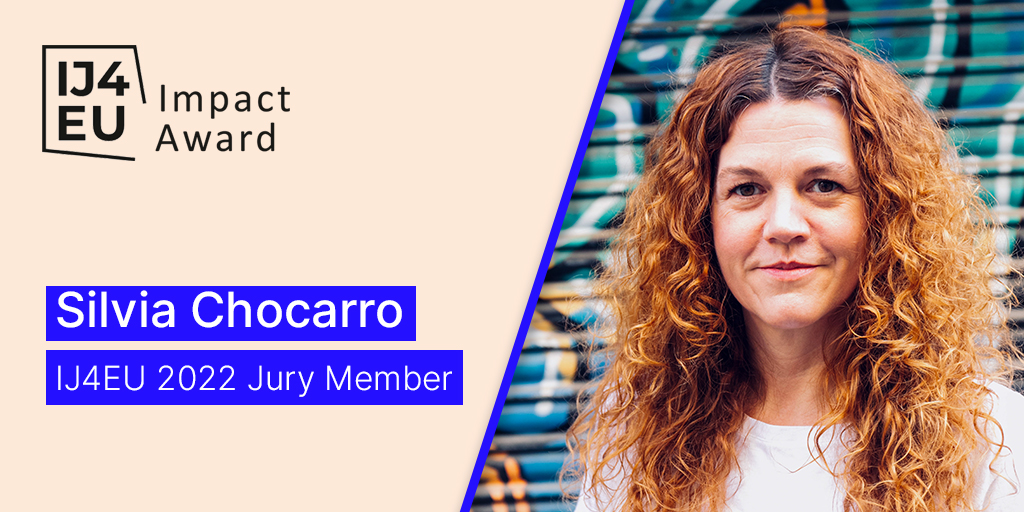
Silvia Chocarrois the Head of Protection at ARTICLE 19, a global organisation promoting freedom of expression worldwide. She sits on the IFEX Council and is a member of the Centre for Freedom of Media, University of Sheffield. In her 20-year career, she worked for media development groups and intergovernmental organisations as well as a journalist for media outlets. She holds a Ph.D. in Journalism from the Universidad Complutense de Madrid, Spain; her dissertation focused on the role of the UN in journalists’ safety. She is the author of several reports on the safety of journalists and gender and media.
-
Boryana Dzhambazova

Boryana Dzhambazova is a freelance journalist, based in Sofia, Bulgaria. She has been reporting on a wide range of topics – from economic and political developments to social affairs and human rights issues. Her work has appeared in the New York Times, the Economist, and Politico Europe, among others.
-
Can Dündar
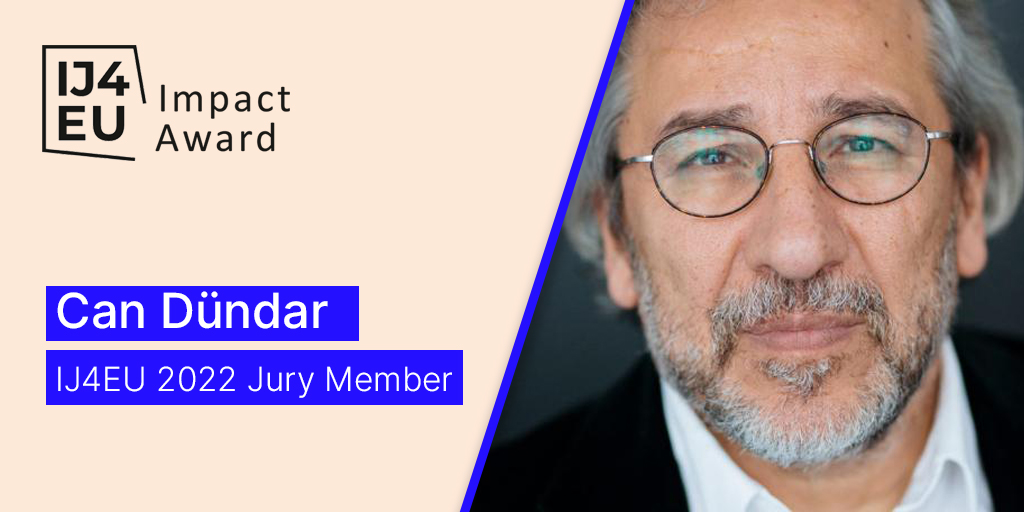
Can Dündar has been working as a journalist for more than 40 years, for several newspapers and magazines. He produced many TV documentaries focusing particularly on modern Turkish history and cultural anthropology. He worked as an anchorman for several news channels. He stepped down from his post as the editor-in-chief of the daily Cumhuriyet in August 2016, after he was imprisoned due to his story on the Turkish Intelligence Service’s involvement in the Syrian war. He was sentenced in absentia to 27 years in jail in December 2020. He found #ÖZGÜRÜZRadio (WeAreFree) in Berlin in 2016. He’s been a columnist for Die Zeit since August 2016. He has made documentaries for ARTE, ZDF, DW, and written more than 40 books, some of which were published German, English, French, Italian, Spanish, Albanian and Chinese.
-
Julia Vernersson

Julia Vernersson is Managing Director of Hostwriter, an award-winning global network that helps journalists collaborate across borders. She has a background in international organisations working with media, freedom of speech and activism and founded the organisation Kulturlabor Trial & Error. In 2021, Hostwriter launched the feminist cross-border newsroom UnbiastheNews.org, to support journalists experiencing structural barriers in the field, working towards a more equitable and inclusive world of journalism.
Investigation Support Scheme 2021
-
Lydia Cacho Ribeiro (chair)
 Lydia Cacho Ribeiro is a journalist, social activist and writer. She is a specialist in research on gender violence, health, childhood and organised crime. She is a Goodwill Ambassador for the United Nations Agency against Drugs and Crime.
Lydia Cacho Ribeiro is a journalist, social activist and writer. She is a specialist in research on gender violence, health, childhood and organised crime. She is a Goodwill Ambassador for the United Nations Agency against Drugs and Crime.For 25 years, she has worked as a journalist, editor and columnist in radio and television as well as in various national and international newspapers and magazines. She is co-founder of the Network of Journalists of Mexico, Central America and the Caribbean.
She founded CIAM Cancún A.C, a care centre for women and children victims of violence, certified by the National Training Center for Domestic and Sexual Violence. She is an expert in child cybersecurity and in the pedagogy of interviewing victims under 18 years of age.
Cacho is also a renowned specialist in journalistic coverage in situations of risk and a survivor of police torture due to her professional work. Her brave journalistic investigations have taken her to 132 countries and made her the most awarded journalist in Mexico with 55 international awards.
Newsweek & The Daily Beast have named her one of the 100 women who move the world. Three of her best-selling works have become university textbooks in several Latin American countries. Her books have been translated into more than 15 languages.
-
Simon Robinson

Simon Robinson is Reuters Global Managing Editor for News Publishing, overseeing the agency’s digital offerings, its editing desk and graphics.
After joining the news service in 2010, Robinson ran investigations and enterprise reporting in Europe, Middle East and Africa, editing award-winning series on Iran, Russia, corporate taxation, Greek banks and migration. He was the Regional Editor for EMEA before taking on responsibility for all recruitment, hiring, training, mentoring, career development and mental health efforts in the newsroom.
Between 1995 and 2010, Robinson was a correspondent and then editor at Time magazine, reporting from more than 50 countries in Africa, South Asia, the Middle East and Europe. He has published short stories and wrote and produced an award-winning satirical movie about aid workers and journalists in Africa.
-
Leila Bičakčić
 Leila Bičakčić is a founding member of the award-winning Center for Investigative Reporting (CIN) in Bosnia and Herzegovina.
Leila Bičakčić is a founding member of the award-winning Center for Investigative Reporting (CIN) in Bosnia and Herzegovina.Specialising in reporting on corruption, the nexus between political elites and organised crime groups and monitoring the use of public funds and politicians’ assets, CIN stories have led to the indictment of a former prime minister, the dismissal of an international judge and final court verdicts in one of Bosnia’s biggest corruption cases.
CIN has won a number of national and international awards, including the Daniel Pearl Awards for Outstanding International Investigative Reporting and the Shining Star Award. Most recently, a CIN story on vote-buying was a finalist for the Investigative Reporting Award of the European Press Prize 2021.
Leila’s responsibilities include overall management of CIN, planning investigative projects, analysis and strategic development. A special focus of her work is research on new models of media sustainability in Bosnia, the transition from traditional media to new digital models and the convergence of media content. A Sarajevo native, she studied basic physics and economics at Sarajevo University.
-
Harry Karanikas
 Harry Karanikas is an Athens-based investigative reporter in print and digital media and a producer of various investigative broadcasts on Greek TV.
Harry Karanikas is an Athens-based investigative reporter in print and digital media and a producer of various investigative broadcasts on Greek TV.His work has included investigations on the role of complex financial deals that were used to cover up Greece’s and other EU countries’ deficits and on the “Greek statistics” that signalled the beginning of the economic crisis. He has also investigated the pharmaceutical industry and the wiretapping of politicians’ phones, and various environmental issues such as the hexavalent chromium pollution of an area outside Athens.
-
Natalia Antelava

Natalia Antelava is a co-founder and editor-in-chief of Coda Story, a digital newsroom created for context and continuity in coverage of crises.
An Emmy nominee and award-winning journalist, Natalia is originally from Tbilisi, Georgia but she started her career freelancing in West Africa. Since then, she had been BBC’s resident correspondent in the Caucasus, Central Asia, Middle East, Washington DC and India. She has covered the Russian invasion of Georgia in 2008, the war in Eastern Ukraine and reported undercover from Burma, Yemen and Uzbekistan.
Her investigations into human rights abuses in Central Asia, Iraq and the United States have won her a number of awards. In addition to a career in broadcast journalism, Natalia has also written for the Guardian, Forbes magazine and the New Yorker, among others.
Freelancer Support Scheme 2021
-
Cheryl W. Thompson
 Cheryl W. Thompson is an investigative correspondent for National Public Radio (NPR) in the United States and the senior editor for its member stations’ investigations.
Cheryl W. Thompson is an investigative correspondent for National Public Radio (NPR) in the United States and the senior editor for its member stations’ investigations.Before joining NPR in 2019, she spent 22 years as an investigative and beat reporter with The Washington Post. Her work has prompted policy changes and state and federal investigations that resulted in the conviction of several elected and appointed officials.
She has won more than three dozen regional and national awards and was part of the Washington Post team that won the Pulitzer Prize for national reporting in 2002 and 2016. She served as the investigative reporting coach for the NPR podcast “No Compromise”, which won the Pulitzer Prize for audio reporting.
In 2018, she was elected the first Black president of Investigative Reporters and Editors, a 6,000-member organisation dedicated to improving investigative journalism. She served three terms in that role and was named board chairman in June 2021. Thompson also is an associate professor of journalism at George Washington University.
-
Jelena Cosic
 Jelena Cosic is the International Consortium of Investigative Journalists’ training manager and Eastern European partnership coordinator. She worked on ICIJ’s Fincen Files, Luanda Leaks and China Cables.
Jelena Cosic is the International Consortium of Investigative Journalists’ training manager and Eastern European partnership coordinator. She worked on ICIJ’s Fincen Files, Luanda Leaks and China Cables.Prior to joining ICIJ, she worked as a reporter, regional coordinator and project manager for the Balkan Investigative Reporting Network, a grouping of non-government organisations promoting freedom of speech, human rights and democratic values across southern and eastern Europe.
Her work also entailed the convening of international investigative teams; overseeing partnerships with other investigative centres; and helping to drive internal technological change.
She has received several investigative journalism awards, including a Certificate of Excellence, Global Shining Light Award; an EU Investigative Journalism Award in the Western Balkans and Turkey; and a Serbian Independent Association of Journalists Award for investigative journalism in online media. At ICIJ, she has been part of a team that has won the Tom Renner Award, been a finalist for the Pulitzer Prize and received a Nobel Peace Prize nomination.
Jelena is an avid trail runner.
-
Eva Kubániová
 Eva Kubániová works for investigace.cz, an independent investigative newsroom based in the Czech Republic.
Eva Kubániová works for investigace.cz, an independent investigative newsroom based in the Czech Republic.She carried out journalistic research into Slovak businessman Marian Kočner and the events leading up to the 2018 murder of Slovak investigative journalist Jan Kuciak and his fiancée, Martina Kušnírová. She has reported on the court trial of the suspects in that case. She won two Slovak journalistic awards for the timeline of the relationship between Kuciak and Kočner.
She also coordinates investigace.cz’s partnership project with investigative centres from Visegrad countries and has worked on cross-border stories concerning the International Investment Bank and misuse of public funds for advertising.
IJ4EU Impact Award 2021
-
Shaun Walker (chair)

Shaun Walker, Central and Eastern Europe Correspondent for The Guardian, is Chair of the IJ4EU Impact Award. He previously spent more than a decade in Moscow and is the author of The Long Hangover: Putin’s New Russia and the Ghosts of the Past.
-
Teresa Ribeiro
 Teresa Ribeiro is Representative on Freedom of the Media for the Organization for Security and Co-operation in Europe. She was previously Secretary of State of Foreign Affairs and Cooperation at the Ministry of Foreign Affairs of Portugal and President of the National Commission for Human Rights.
Teresa Ribeiro is Representative on Freedom of the Media for the Organization for Security and Co-operation in Europe. She was previously Secretary of State of Foreign Affairs and Cooperation at the Ministry of Foreign Affairs of Portugal and President of the National Commission for Human Rights. -
Christian Jensen
 Christian Jensen is Executive Editor-in-Chief of Danish newspaper Politiken, a role he has had since 2016. Before that, he had an extensive career in Danish journalism.
Christian Jensen is Executive Editor-in-Chief of Danish newspaper Politiken, a role he has had since 2016. Before that, he had an extensive career in Danish journalism. -
Nassira el Moaddem
 Nassira el Moaddem is a French journalist whose book Les Filles de Romorantin was nominated for two of France’s most prominent journalism book prizes in 2020. Nassira is also the host of TV show Arrêt sur Images and has worked across French journalism.
Nassira el Moaddem is a French journalist whose book Les Filles de Romorantin was nominated for two of France’s most prominent journalism book prizes in 2020. Nassira is also the host of TV show Arrêt sur Images and has worked across French journalism. -
Andrzej Rojek
 Andrzej Rojek is a Polish-born US philanthropist with a focus on freedom of speech. He serves as Chair of the Board for the Jan Karski Educational Foundation and helps numerous charitable initiatives in education, scientific exchanges and freedom of speech.
Andrzej Rojek is a Polish-born US philanthropist with a focus on freedom of speech. He serves as Chair of the Board for the Jan Karski Educational Foundation and helps numerous charitable initiatives in education, scientific exchanges and freedom of speech.
Investigation Support Scheme 2020
-
Wolfgang Krach (chair)
Wolfgang Krach is editor-in-chief of Germany’s Süddeutsche Zeitung newspaper.
-
Giannina Segnini
Giannina Segnini is a professor of data journalism at Columbia University and a Costa Rican investigative journalist.
-
Cândida Pinto
Cândida Pinto is deputy director for news at RTP public broadcaster in Portugal.
-
Espen Sandli
Espen Sandli is editor-in-chief of Drammens Tidende in Norway.
-
Leila Bičakčić
Leila Bičakčić is director of the Centre for Investigative Reporting in Bosnia and Herzegovina.
IJ4EU 2018
-
Wolfgang Krach (chair)
Wolfgang Krach is editor-in-chief of Germany’s Süddeutsche Zeitung newspaper.
-
Cecilia Anesi
Cecilia Anesi is co-founder of the Investigative Reporting Project Italy.
-
David Boardman
David Boardman is dean of Klein College of Media and Communication, Temple University, in the United States.
-
Pavla Holcová
Pavla Holcová is the founder of the Czech Centre for Investigative Journalism.
-
Christian Jensen
Christian Jensen is editor-in-chief of Danish newspaper Politiken.